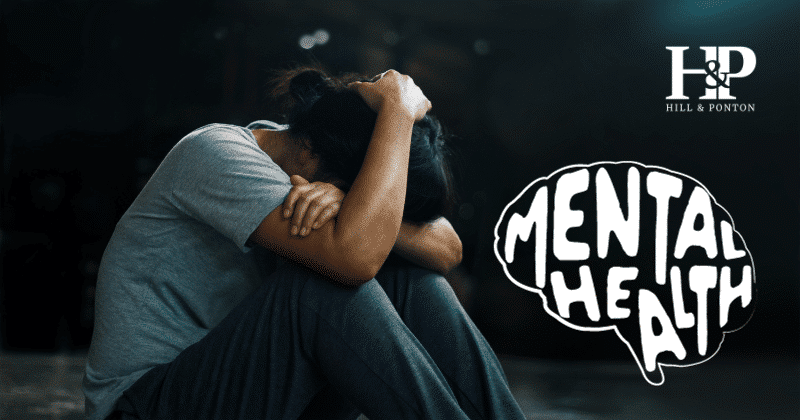Serving in the military comes with profound experiences – moments of pride, resilience, unity, and sometimes, encounters that leave lasting impressions on the mind.
Conditions like Post Traumatic Stress Disorder (PTSD) and Major Depressive Disorder (MDD) might sound like jargon from a medical textbook, but they represent real feelings and hurdles that many veterans grapple with.
In this blog, we’ll delve into PTSD vs depression, their similarities and distinctions, and how to access the right assistance and support by exploring VA benefits.
Major Depressive Disorder (MDD) Explained
Often, life throws curveballs, and everyone feels down or blue once in a while. But for some, especially veterans who have faced unique challenges during their service, these feelings might be more profound and long-lasting.
This is where Major Depressive Disorder, or MDD, comes into play. MDD is a medical condition where feelings of sadness and despair linger and dominate daily life.
Unlike short-term emotional responses to life challenges, MDD is persistent. For many with this condition, they feel as though a cloud of sadness has been hanging over them for most of their lives.
Key Symptoms of MDD
- Depressed or irritable mood: More than just feeling down, it’s a constant feeling that’s hard to shake off.
- Changes in appetite: Some might lose their appetite, while others could end up eating more than usual.
- Sleep disturbances: Struggling to get out of bed, feeling constantly tired, or, conversely, having trouble sleeping.
- Constant fatigue and low energy: Feeling drained, even if you haven’t done much.
- Trouble thinking or concentrating: Simple tasks or decisions suddenly feel monumental.
- Feelings of worthlessness or guilt: Harsh self-criticism and an overwhelming sense of regret.
- Hopelessness: A feeling that things won’t get better no matter what.
The Unique Challenges Faced by Veterans with MDD
Military service, with its distinct pressures and experiences, can sometimes amplify these symptoms or be a triggering factor.
Combat stress, witnessing the suffering of others, or even the transition to civilian life can intensify feelings of isolation or hopelessness.
Being away from loved ones for extended periods or physical injuries can also contribute to the onset of MDD.
It’s important to note that MDD isn’t a sign of weakness or a character flaw. It’s a medical condition, and like any other health challenge, it can be managed and treated, especially with the right support.
About Post Traumatic Stress Disorder (PTSD)
Unlike MDD, which is a mood disorder that can affect anyone regardless of their life experiences, PTSD is specifically tied to traumatic events.
These might include natural disasters, accidents, personal assaults, or, very commonly for veterans, experiences from combat and service.
PTSD isn’t just about feeling stressed after a traumatic event; it’s about being stuck in that trauma, replaying it over and over, even when the danger is long gone.
Recognizable Symptoms of PTSD
If you, or someone you know, went through a traumatic event and started exhibiting some of the following symptoms, it might be PTSD:
- Unwanted traumatic memories: These aren’t just normal memories; they’re intrusive and can suddenly pop up without warning.
- Flashbacks: It feels as if the traumatic event is happening all over again.
- Emotional or physical reactions to reminders: Seeing, hearing, or even smelling something that takes you back to the trauma, causing distress.
- Avoidance: This means steering clear of reminders of the trauma. This could be avoiding people, places, or even conversations related to the event.
- Negative changes in thoughts or moods: Persistent negative feelings about oneself or others, feeling detached from loved ones, or a sense of hopelessness about the future.
- Hyperarousal: Feeling constantly on edge, being startled easily, or having trouble sleeping.
Veterans and the Intricacies of PTSD
For many veterans, PTSD can manifest differently because of their unique exposures. Combat, witnessing harm to fellow soldiers, or even the moral quandaries faced during service can lead to what some refer to as “combat stress.”
This is a subset of PTSD symptoms specifically tied to the challenges of military service. Furthermore, the brotherhood and sisterhood among service members mean that the loss or harm to a comrade can feel intensely personal. This can exacerbate feelings of guilt, anger, or sadness.
It’s also worth noting that PTSD isn’t exclusive to combat roles. Non-combat roles in the military, with their own sets of challenges, can also lead to PTSD.
Comparing MDD vs. PTSD
For many, the line between MDD and PTSD can seem blurred, especially since both disorders share overlapping symptoms. Moreover, the unique experiences of veterans can sometimes compound these feelings, making it difficult to pinpoint which disorder (or both) one might be grappling with. Let’s try to understand the core distinctions and similarities.
Shared Symptoms
While MDD and PTSD are distinct conditions, they do share certain symptoms, which can sometimes make them challenging to distinguish:
- Trouble sleeping: Whether it’s insomnia or excessive sleeping, disturbances in sleep patterns are common in both conditions.
- Lack of interest: A decreased interest in hobbies, activities, or social interactions is prevalent in both disorders.
- Irritability or bad temper: Quick flare-ups or prolonged periods of irritability can manifest in individuals with either condition.
- Emotional detachment: Feeling distanced or detached from loved ones or the world at large.
Differentiating Factors for Veterans
While shared symptoms exist, there are key differences that can help distinguish between MDD and PTSD:
- Root Causes
- MDD: Often arises from a complex interplay of genetic, biological, environmental, and psychological factors. It might not always be linked to a specific event.
- PTSD: Directly tied to experiencing or witnessing a traumatic event. For veterans, this is often related to service experiences.
- Emotional Responses
- MDD: Persistent feelings of sadness, hopelessness, and lack of self-worth.
- PTSD: Responses are often tied to reminders of the traumatic event, leading to flashbacks, hyperarousal, or avoidance behaviors.
- Duration
- MDD: The feelings can persist for long durations without any apparent trigger.
- PTSD: Symptoms usually start appearing within 3 months of the traumatic incident but can sometimes surface years later.
Can Someone Have Both Depression and PTSD?
The complex nature of these disorders means that it’s entirely possible for an individual, especially a veteran, to be diagnosed with both.
Traumatic events from military service can lead to PTSD, and the prolonged stress and changes associated with it can trigger MDD.
This coexistence can compound the challenges faced, but recognizing both conditions can lead to more comprehensive treatment and support.
Establishing Service Connection
For any veteran seeking VA benefits for a mental health condition, the critical first step is establishing a “service connection.”
This connection is a link between the mental health disorder and a specific event or series of events during military service.
- Documentation and Evidence:
- Medical records indicating the presence of symptoms during service.
- Buddy statements or testimonials from fellow service members corroborating the events or the change in behavior.
- Therapy or counseling records post-service that relate the condition to the military service.
- The Importance of Diagnosis: Having a formal diagnosis of MDD, PTSD, or both from a licensed professional is pivotal. This diagnosis acts as a foundation for your claim.
VA Attorney Tips for Establishing Service Connection
Attorney Shannon Brewer talks through the ins and outs of Combat Related PTSD. This video will explain how to get service connected:
If you developed combat or non-combat related PTSD, depression or another medical condition and were denied or underrated by the VA, our legal team may be able to help you. Get a free evaluation of your VA claim today.
Free case evaluationTreatment and Support for Veterans
Seeking and undergoing treatment is not just essential for personal well-being, but it can also strengthen your VA claim. Continuous medical records can provide robust evidence of the condition’s severity and its impact on daily life.
- Therapies and Medications:
- A range of therapies, including cognitive-behavioral therapy and EMDR, have shown effectiveness for PTSD and MDD.
- Medications can help regulate mood and manage symptoms. Always discuss potential side effects with a medical professional.
- Veteran-specific resources:
- VA Medical Centers: Comprehensive healthcare services, including mental health treatments.
- Vet Centers: Counseling, therapy, and support, especially for combat-related PTSD.
- VA PTSD Program Locator: A tool to find specialized PTSD treatment programs within the VA system.
- National Center for PTSD: A hub of resources, research, and tools for veterans with PTSD.
Frequently Asked Questions (FAQ) About MDD and PTSD
When diving into the complexities of MDD, PTSD, and VA benefits, numerous questions can arise. We’ve compiled some frequently asked questions to shed light on these topics and guide veterans in their journey to understanding and seeking support.
Can I Get VA Disability Rating for Both PTSD and Depression?
Navigating the VA rating system for PTSD and Depression requires a few key steps:
- Obtain a distinct medical diagnosis for each condition.
- Ensure there’s a clear nexus, or link, that establishes a service connection for both PTSD and Depression.
- Present ongoing symptoms of these mental health conditions.
However, it’s essential to understand that veterans typically receive a rating for only ONE mental health condition.
This approach is rooted in a legal principle called “pyramiding.” Essentially, pyramiding tries to avoid evaluating the same disability under multiple diagnoses or using non-service-connected symptoms to establish an evaluation.
Are PTSD and Depression the Same VA Disability?
Depression is often considered a symptom of PTSD and when a veteran has both conditions it’s common for the VA to treat PTSD and depression as the same disability.
An exception exists: if it’s possible to clearly differentiate the symptoms attributable to each diagnosis, a veteran might receive ratings for more than one mental health condition.
But, in most scenarios, this differentiation is challenging due to the overlapping symptoms.
How does the VA evaluate the severity of my condition?
The VA uses a rating system, ranging from 0% to 100%, to determine the severity of a disability. This rating reflects how much the condition impacts your daily life and ability to work.
For mental health conditions like MDD and PTSD, evaluations consider factors like social interactions, cognitive function, and general well-being. The higher the rating, the more compensation a veteran can receive.
Where can I get diagnosed to support my VA claim?
Veterans can seek diagnoses from VA medical centers or private healthcare providers. It’s crucial to ensure that the diagnosis is detailed and clearly ties the condition to specific events or experiences during military service.
I faced trauma but don’t have PTSD symptoms. Can I still claim benefits for MDD?
Answer: Yes. Experiencing trauma doesn’t necessarily mean one will develop PTSD. Traumatic experiences can lead to various mental health conditions, including MDD.
If a veteran can establish a service connection between their MDD symptoms and a traumatic event (or series of events) during their military service, they can potentially claim VA benefits for MDD.
Are you considering appealing for benefits for MDD or PTSD?
We may be able to help win your claim. Fill out a case evaluation form for more information.





